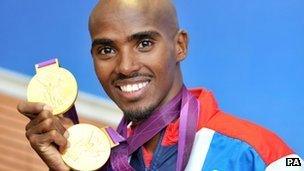Olympic legacy on school sport 'on life support'
- Published

Mo Farah's Olympic performance was voted the most inspiring of the London Games
The Olympic legacy on school sport is "on life support" and more needs to be done to ensure it lasts beyond two years, MPs say.
The Commons Education Committee says many schools lacked facilities and that this limited opportunities for youngsters to get involved in sport.
Without wide experience of sport in school many elite athletes would not have discovered their talent, they add.
The government said schools would have £300m to spend on PE over two years.
MPs on the committee say funding systems should be changed to enable long-term investment.
The committee highlighted the fact that the London Games was the first "where the notion of legacy was built into the initial bid".
Lack of facilities
But some said the "opportunity to inspire a generation and build on the success" of the Olympics had been "missed", while another described it as "on life support".
Although there was a surge in interest in sports, the committee heard, it did not translate into "people turning up at clubs".
The School Games, in which schools compete against each other from local to national level, was pointed to by some witnesses as a good example of the Olympic Legacy.
But there were concerns that it only appealed to talented athletes and that not all children would be able to take part.
And it was pointed out that the School Games needed much more guaranteed funding for it to last as a legacy.
The committee also heard concerns about the lack of sporting facilities in schools, with swimming pools highlighted as a particular problem.
One east London school, Plashet School, stressed how important it was that local people got to use the facilities of the Olympic Park, such as the aquatics centre.
'Short-term fixes'
The head teacher of a school in Cornwall talked about the difficulties of rural schools like hers getting access to facilities at all.
However, ministers insisted that more than 1,000 facilities had already been upgraded, but admitted more needed to be done.
The committee also heard from elite athletes how important it was for young people to access a broad range of sports so that they could see whether they were good at an activity or not.
The committee concluded that the chance to realise a legacy of the Games had not yet been lost, further action needed to ensure it lasted into the future.
Committee chairman Graham Stuart said: "High quality school sport is vitally important. It provides young people with opportunities to improve their education, health and well-being.
"We need to be encouraging all young people to take part in sport; whether they enjoy the competition of football, rugby or netball or prefer non-competitive activities. Schools must provide a range of activities that appeal to all.
"Successive governments have kicked school sport around as a political football, announcing short-term fixes without any sustained vision for the future. Occasional pump-priming is simply not good enough for something so important.
"If the government want to capitalise on the legacy of London 2012 it must commit to programmes and funding for the long-term."
A Department for Education spokesman said the government had spent £750,000 training specialist PE teachers and schools would be given £300m to spend on physical education over the next two years.
"We have asked Ofsted to hold schools to account for how they well they spend the money," he said.
The new PE curriculum would end the "damaging 'prizes for all' culture", the DfE added.
Two hours
But shadow education secretary Stephen Twigg said: "A year after the Olympics, David Cameron and Michael Gove have failed to create a legacy for school sport.
"Surveys suggest pupils are not doing enough PE, and the replacement for Labour's successful School Sport Partnerships is slammed by this independent committee as little more than a gimmick. This government needs to take school sport seriously - they should start with restoring Labour's requirement that all pupils do a minimum of two hours of sport a week."
The report also warned against an overemphasis on competitive sport in school.
It said: "The government has placed an emphasis on competitive sport being taught in schools. While this brings with it many benefits, this emphasis can also deter many young people from taking part in sport at all.
"We recommend that the Department for Education makes clear to all schools that they must offer both competitive and non-competitive sporting opportunities for their pupils, to ensure that all young people feel able to take part in sport and enjoy the benefits it brings."
- Published19 July 2013
- Published14 February 2013
- Published19 November 2012